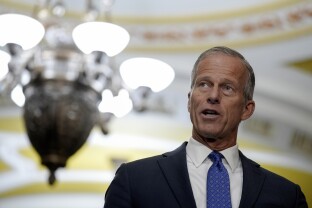Sen. John Thune will be the new Republican majority leader, ushering in the first leadership shift in 18 years but a sign that senators aren’t totally willing to relinquish the Mitch McConnell era.
Thune won, 29-24, on the second ballot against Sen. John Cornyn, despite an intense outside pressure campaign led by conservative commentators and MAGA allies in favor of Florida Sen. Rick Scott. Scott positioned himself as the most Trump-aligned of the three men running but lost on the first ballot.
Still, in his first press conference as leader, Thune vowed to be a unifying force for the GOP with a single-minded mission: advancing Donald Trump’s agenda and unwinding Joe Biden and Chuck Schumer’s record.
“This Republican team is uniting,” Thune said. “We are on one team.”
Thune had just four public backers heading into the conference meeting: Sens. Mike Rounds, Markwayne Mullin, Kevin Cramer and NRSC Chair Steve Daines. Scott had more public supporters, but in a closed-door process via secret ballot, Thune had the numbers where Scott had met his ceiling. Thune has been a loyal McConnell ally and is currently his top deputy in the Senate. McConnell has led Senate Republicans since 2007, two years into Thune’s first term as senator.
Despite not making a public endorsement in the race, Trump’s influence loomed large. He has criticized Thune for years, calling him a RINO and openly pushing South Dakota Gov. Kristi Noem to primary him in 2022 (Noem, now being tapped to lead the Department of Homeland Security, declined). Earlier this week, senators told NOTUS that Trump staying out of the race was a good thing and they hoped he would continue to do so — despite some of his fiercest allies like billionaire Elon Musk publicly advocating for Scott.
With a secret-ballot process unlike the House, senators were largely shielded from the criticism that could come from Trump acolytes for backing Thune.
Scott largely ran on his Trump bona fides. In a postelection statement, he said, “While it isn’t the result we hoped for, I will do everything possible to make sure John Thune is successful in accomplishing President Trump’s agenda.” Whether that means he’ll make Thune’s reign as leader harder or easier remains to be seen.
In February, McConnell announced he would be stepping down from leadership after the election, though he will remain in the Senate (his term expires in 2027).
Immediately after McConnell’s announcement, the two “Johns” emerged as the two contenders. But some conservative senators looking to fundamentally shake up the Senate coalesced around Scott.
Scott touted himself as an outsider compared to Thune and Cornyn, though he led the NRSC in 2022 through a disastrous cycle, losing races in Georgia, Nevada, Arizona and Pennsylvania that were seen as winnable but stymied by weak candidates and poor fundraising under Scott’s leadership. Scott then challenged McConnell for leadership in 2022 — the first challenge of McConnell’s tenure — and lost 37-10. This time, Scott only picked up three additional votes on the first ballot, earning 13 votes vs. Cornyn’s 15 and Thune’s 23 votes.
Thune and Cornyn ran on largely similar platforms geared toward opening the amendment process and engaging senators on legislation well ahead of votes. McConnell’s critics on the right point to his strong-arming of power among leadership, weakening the committee chairs and other senators’ ability to push amendments or shape legislation in a meaningful way.
Thune is pushing to open the process, but as McConnell’s number two, wasn’t seen by senators as the leader to shake the Senate to its core.
What Thune does bring to the table is a depth of relationships among colleagues and a strong fundraising arm that Scott lacks.
Thune transferred $4 million to the NRSC in September, the largest ever transfer for a Senate Republican. He broke his own record of $2 million in 2016.
One of Thune’s top supporters, Sen. Kevin Cramer, told NOTUS after the election that he’s feeling “great.”
But he also signaled that the new leader might already have his hands full balancing his conference and Trump, particularly over a procedural move to fast-track nominations that the president-elect has pressured Thune to approve.
“I’d like to avoid them, if I can,” Cramer said. “I think the separation of powers is pretty fundamental.”
—
Katherine Swartz, Casey Murray and Claire Heddles are NOTUS reporters and Allbritton Journalism Institute fellows. Riley Rogerson is a reporter at NOTUS.
Sign in
Log into your free account with your email. Don’t have one?
Check your email for a one-time code.
We sent a 4-digit code to . Enter the pin to confirm your account.
New code will be available in 1:00
Let’s try this again.
We encountered an error with the passcode sent to . Please reenter your email.


